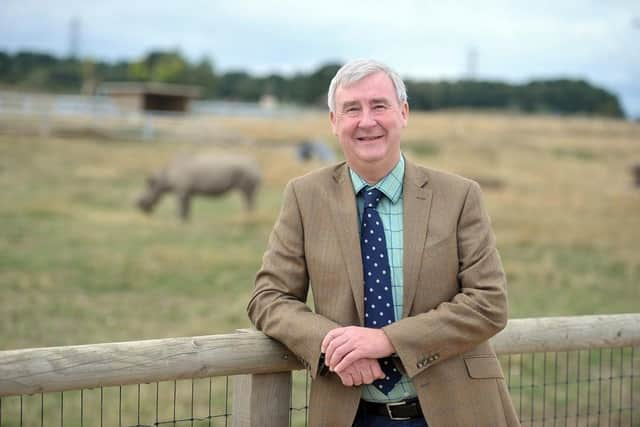The Yorkshire Vet star Peter Wright shares his thoughts on climate change after he was spotted driving a new eco-friendly car
The Yorkshire Vet star recently switched his car from a Land Cruiser to hybrid electric vehicle Toyota Highlander, which he has been using for the past few months for his work visiting and treating animals across the North Yorkshire Moors and Dales National Parks.
The famous Yorkshire vet talked to Toyota about his views on climate change, global warming and what his favourite drives are in Yorkshire.
Advertisement
Hide AdAdvertisement
Hide AdWhen asked what driving modes he uses between Eco, Normal, Sport and Trail and what his favourite drives are in Yorkshire or elsewhere, Peter said: “Driving in Eco mode makes me very conscious of how a driving technique can help maximise fuel efficiency, particularly on country lanes and farm visits, where stopping and starting is the norm. It goes without saying, on farm visits where rough terrain is involved, the Trail mode is ideal.


“I never tire of driving around my beloved Yorkshire. I live close to Sutton Bank - a treacherous incline on the A170. This is the gateway to the North York Moors National Park.
“I particularly enjoy driving through Farndale and Rosedale and on to the North Yorkshire coast, visiting so many beautiful towns and villages in the coastline between Scarborough and Whitby.”
When discussing climate change, Peter revealed that he has been passionate about caring for the environment his entire life.
Advertisement
Hide AdAdvertisement
Hide Ad“Nowadays there are wide-ranging concerns about how humans are damaging the planet. I see first-hand how insect numbers have decreased around my garden and fields, how bee numbers have declined, and how several species of birds that were once common visitors to my home, now appear more rarely.
“I look at our picturesque coastline where rivers and streams carry tons of debris and plastics that are doing untold damage to our wildlife and sea life. I worry about unseen toxins such as micro-plastics which are in many of our modern clothes and products and are now found increasingly in the digestive tracts of our sea creatures.
“It is also widely recognised that our coastal seabirds are in alarming decline. Global warming and rising sea temperatures mean that these birds’ staple diets such as sand eels can no longer thrive, so they are struggling to survive. We humans at the top of the food chain need to take far greater action to help repair nature’s balanced ecosystem before it collapses with dire consequences for us all.”
When asked what he is enjoying about the current series of The Yorkshire Vet, Peter said: “Leaving Skeldale Veterinary Centre in Thirsk after 40 years, initially working as a veterinary assistant to James Herriot and for the last 20 years as senior partner, I am now working part-time at Grace Lane Veterinary Practice in Kirkbymoorside, a beautiful market town.
Advertisement
Hide AdAdvertisement
Hide Ad“My daily routine is very similar though, and I like the fact that I have retained some of the longstanding clients who have appeared on The Yorkshire Vet over the last seven years and have also been introduced to many new ones. I think it’s obvious to viewers that the warmth, humour and resilience of Yorkshire people, particularly farmers, still shines through.”
Comment Guidelines
National World encourages reader discussion on our stories. User feedback, insights and back-and-forth exchanges add a rich layer of context to reporting. Please review our Community Guidelines before commenting.